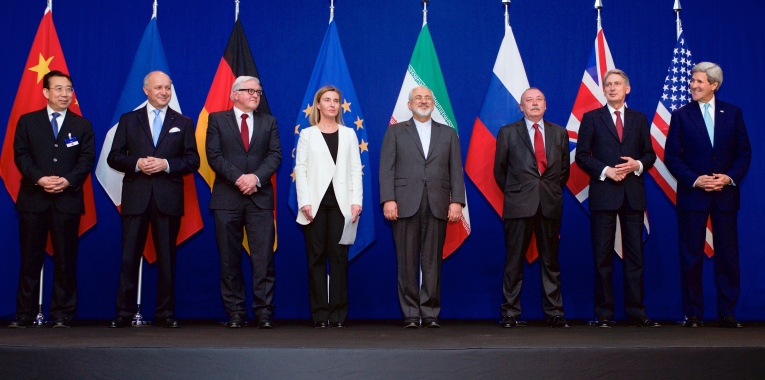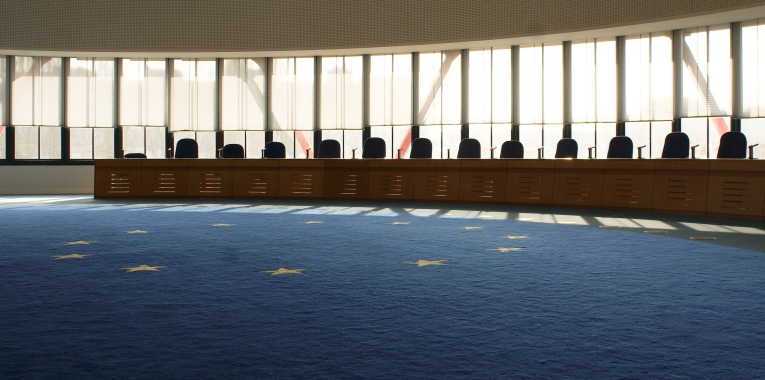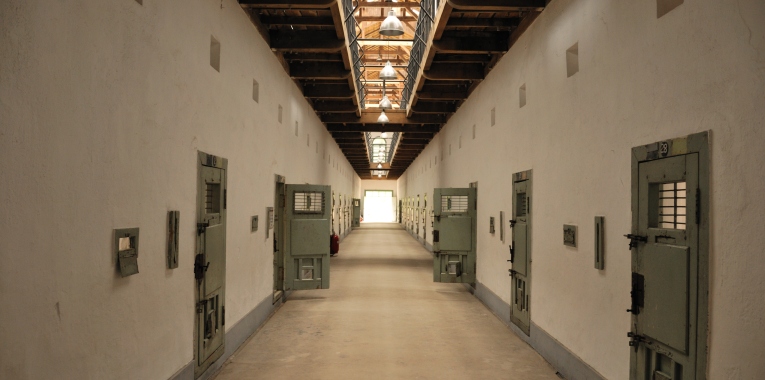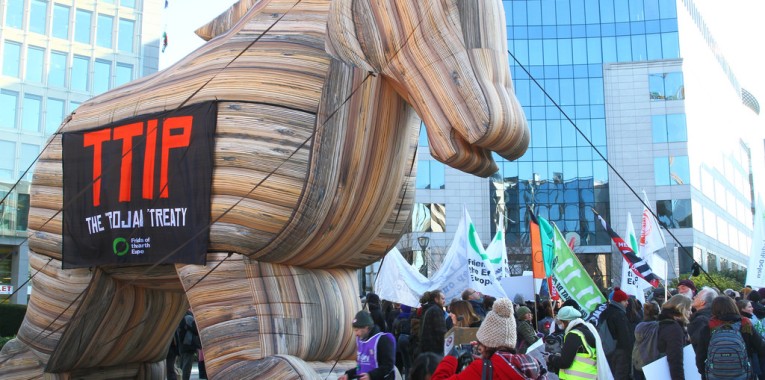Back in November, the Policy Centre for European Affairs ran a Hackathon on “European cohesion in the age of populism: How should the EU strengthen European identity to counterbalance Eurosceptic forces?”. Euroscepticism and populism aren’t the only forces causing division in Europe and threatening the European project, but the motivation behind this event was to try and understand in what ways the European Union (EU) could strengthen its internal ties in order to secure its future. This is a hard question, because the EU is not in the best position to fight these forces. The EU is clearly more than a conventional international organization, but it has not yet become part of policy discussions at a state level. Even if it wished to increase its influence and assert its leadership position, there would always be strong opposition to giving EU institutions the kind of powers it would need to do so. Perhaps the solution for the future of the European project may not exist via top-down approaches championed by EU institutions. Instead, a bottom-up political movement may be needed.
Continue reading “Volt Europa: A New Path to The European Dream?”Tag: EU
Migration and pandemics: an Immiscible Mix
In light of the COVID-19 pandemic, it has been widely reported that marginalised groups in societies have been disproportionately impacted by the outbreak. Among those who are likely to suffer greater consequences the migrant communities across the world.
Migrants endure the consequences of the pandemic to a greater extent when compared to other groups – such as natives – for various reasons. Firstly, migrants often suffer from unequal access to basic services such as healthcare. This is more common for those on short-term visas or in irregular situations. In situations where migrants are granted access to healthcare services in the host nation, they remain constrained due to the lack of linguistic diversity in service provision, xenophobia, and limited knowledge of the host country.
Continue reading “Migration and pandemics: an Immiscible Mix”Tackling the EU democratic deficit by increasing the representativity of the European Parliament
- Background
In recent years, political participation of European citizens has been decreasing. Voter turnout has declined from 62% in the first European Parliament (EP) elections in 1979 to 43% in 2014. At the same time, the 2018 Eurobarometer shows low levels of trust of citizens in the European Parliament (50%) and the European Commission (46%). Many critics argue that the EU suffers from a democratic deficit, noting that EU decision-making procedures are either inaccessible or excessively complex for ordinary citizens to comprehend and engage with. The latter accusation contradicts the notion of liberal democracy, which is one of the EU’s core values and a condition of membership.
Continue reading “Tackling the EU democratic deficit by increasing the representativity of the European Parliament”Will the EU finally tend its own garden?
Why the talk of a new ‘European awakening’ in the defence sphere is just rhetorical window-dressing.
‘We will not protect the Europeans unless we decide to have a true European army.’ Ever since Emmanuel Macron uttered these words in November 2018, the idea of a European Army is back in vogue. A year and a half later, it might appear like the stars are aligning to create the perfect conditions for a ‘golden Era’ of European defence cooperation.
The Iran Nuclear Deal: The End of the Beginning
Despite signing and ratifying the Treaty on the Non-Proliferation of Nuclear Weapons (NPT) in the late 1960s and early 1970s, Iran was considered a security threat by the international sphere due to suspicion about its development of nuclear weapons. The NPT signatory countries are not willing to allow Iran to develop nuclear weapons due to, primarily, two main reasons. Iran’s close ties with non-state actors Hamas and Hezbollah undermine its international legitimacy. Furthermore, its heated rivalry with regional neighbours Israel and Saudi Arabia and neighbouring threats such as those posed by Afghanistan’s drug trade, the Islamic State (ISIS or ISIL), or Iraq’s instability could drive Iran to use nuclear weapons against them if it had them, or so the international community believes.
However, there is no clear explanation as to what would happen if Iran acquired nuclear weapons. Nuclear alarmists, experts who believe nuclear proliferation is a security threat, believe that if Iran were to acquire nuclear weapons, a nuclear chain reaction would succeed, so Egypt, Saudi Arabia, or Turkey would follow Iran’s steps. In a similar way, they argue that Iran’s access to nuclear weapons would be yet another factor to a global “tipping point” in which nuclear proliferation would spread so quickly that almost any country would acquire them. Moreover, nuclear alarmists deem the second nuclear age (considered to have begun in 1991) to be less predictable, more complex, and therefore more dangerous than the Cold War due to the existing horizontal nuclear proliferation.
On the other hand, others agree that a nuclear Iran would not pose as terrible a threat as some consider. In this sense, Gavin contends that the threat Iran poses as a rogue state was already experienced in the Cold War with the Soviet Union and the People’s Republic of China. Indeed, he believes that an Iran with nuclear weapons would gain international legitimacy and security, thus making it less aggressive than it has been by forcing it to act with great restraint. It is unlikely that Iran would transfer its nuclear stockpile to Hamas or Hezbollah for it would be too scarce and, therefore, too precious to give away so easily.
The nuclear deal between Iran and the P5+1 (United States, United Kingdom, France, Russia, China, and Germany), which was accepted on 16th of January 2016, seems to be a solution to the question. The agreement seeks to limit and control Iran’s nuclear activities, as well as ensuring that no nuclear weapon is developed for any of the aforementioned possible ends. In consequence the United Nations (UN) sanctions on Iran to stop its uranium enrichment and conversion activities are to be lifted. Hence, the deal is supposed to be a stabilising factor to Middle East turmoil for at least its timespan (15 years).
This brings us to the question: is the nuclear deal definite, that is, will the nuclear deal permanently stop Iran from obtaining nuclear weapons? Views differ on the effectiveness of the deal. The Gulf Cooperation Council (GCC) composed of Bahrain, Kuwait, Oman, Qatar, Saudi Arabia, and the United Arab Emirates, while supporting the deal, reflects concern over the lifting of the UN sanctions in the belief that these will allow Iran to expand Shiite influence in the region at the expense of Sunnis. Israel is also concerned over an Iran with no sanctions to limit its foreign policy. As Israeli Prime Minister Binyamin Netanyahu stated, Israel would increase its defence and warned against violation of the agreement.
Previous US secretaries of state Henry Kissinger and George P. Schultz are open to the possibility of a future nuclear Iran given that the deal only temporarily restricts Iran’s facilities and material but does not give them up. They further argue that violating the agreement will be easy and difficult for the international sphere to detect. US allies in the region might conclude that the US has switched nuclear cooperation for the acceptance of Iranian hegemony. Moreover, they believe that the Middle East will not stabilise itself since Sunni states will resist Shiite dominance in the region.
Hence, it is clear that the Iranian nuclear deal should not be regarded as final or ultimate. It is a mere phase during which long-lasting solutions to the question should be found. It is now up to the P5+1 to lead talks with Iran and other key regional actors to find the best solution to stabilise the Middle East in nuclear terms and settle any possible security threats among the states.
A possible future nuclear Iran does not represent a threat to the international society, but it would to regional neighbours such as Israel and Saudi Arabia. Iran’s primary aims in acquiring nuclear weapons are international legitimacy by which it would be able to increase trade relations with the West and Asian countries and security from bordering states and non-state actors that could bring instability to its territory. It would be very unlikely that Iran would supply such weapons to Hamas or Hezbollah for their destructive power, their value, and the possible destruction of the Iranian state are too much of a risk. However, assuming Iran’s rational use of nuclear weapons is a grave mistake, for one cannot completely assume any state to be absolutely rational. Thus, though a nuclear Iran may not pose a serious threat, the international community should be always be wary and prepared to take action in case its activities endanger Middle East security.
In regards to the threat a nuclear Iran represents to key regional actors, the International Atomic Energy Agency (IAEA) responsible for the peaceful use of nuclear technology should implement a strong binding agreement for the transparency of nuclear activities in the Middle East by which all regional actors should adhere to without exception. Such transparency would allow any regional state to know whether one is developing or is very close to developing nuclear weapons. Information would promote peace among such nations, though for such information to be reliable and valuable, strict measures should be applied to avoid corruption or covert activities leading to misinformation. These measures should not gravely restrict a country’s sovereignty, but should indeed carry out their purpose effectively.
Perhaps effective cooperation and honesty, as well as preparation for the worst scenario, may be a further step in the path to Middle East peace and stability.
Mireia Raga Gómez
Argue with an Academic: Anthony Speaight QC on a British Bill of Rights
Most Britons are aware, if only from last year’s celebrations, that Bills of Rights, like the industrial revolution, started here. Magna Carta is not the only one; we had another Bill of Rights, called just that, in 1689. That pair, along with their offshoots like Habeas Corpus and jury trial, have encapsulated a heritage of freedom which has spread from this country to many parts of the globe. Continue reading “Argue with an Academic: Anthony Speaight QC on a British Bill of Rights”
Brexit: The British Inability To Comprehend Bro-operation
On 11 November 2015, Prime Minister David Cameron delivered a speech on ‘The Future of Britain’s Relationship with the European Union’. Delivered at Chatham House, he outlined the four reforms the United Kingdom sought from the European Union: economic governance, competitiveness, sovereignty, and immigration. Continue reading “Brexit: The British Inability To Comprehend Bro-operation”
Prisoner Voting Rights
The issue of prisoner voting rights is an issue that has been subject to vigorous political and legal debate in the UK over the past decade. For many on the right of the political spectrum this issue has become the target for frustration over the influence of European institutions on UK law and raises the fundamental issue of sovereignty. For those on the left it is symbolic of a battle against the erosion of human rights and signifies the pursuit of a more rehabilitative theory of justice. Continue reading “Prisoner Voting Rights”
TTIP – A corruption of Europe’s own making
Uniting citizens across Europe, bashing TTIP has been a welcome unifier for a continent in chaos. TTIP, the Transatlantic Trade and Investment Partnership, is a trade treaty the European Union is currently negotiating with the US. Whatever our internal differences may be, Europe is united in its dislike of extreme American capitalism. Conservative, liberal or socialist, in the US we would all be shades of Democrat. Right? Well, maybe yes, but US capitalism and its horrors are only a part of the problems inherent in TTIP. We Europeans are to blame for its real problems. Continue reading “TTIP – A corruption of Europe’s own making”









